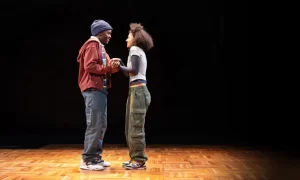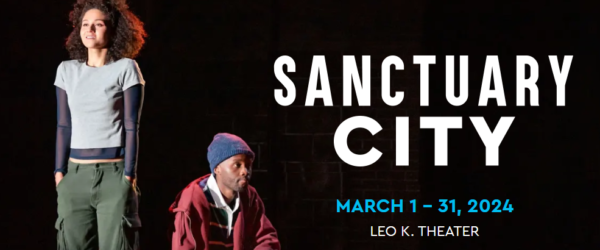“I’m from here. Even though I was born in… I’m from here.”
What does it mean to be American? Millions are denied the coveted classification of citizenship, cast to the margins of the United States for the simple, arbitrary distinction of being born elsewhere. Seattle Rep’s production of acclaimed playwright Martyna Majok’s latest offering Sanctuary City invites us into a world many choose to look away from, asking us to feel alongside two people who are American in everything but paperwork. It’s a rousingly compassionate, complex, and utterly brilliant production, one that shines a light on the American imagination’s greatest blind spot.
Sanctuary City follows two undocumented teenagers, referred to only as G (Emilee Maureen Hanson) and B (Junior Nyong’o), in a freshly post-9/11 New York City – a decidedly hostile environment for anyone not American-born. The first act is a stunning series of vignettes depicting the blossoming of our protagonists’ friendship, born from the struggles unique to their foreign-born, but distinctly American, experience. G leans on B as a refuge from her abusive father, and B finds solace in G when his mom returns to her home country, leaving him to fend for himself as an undocumented teenager in NYC. Things start to look up for the two when G’s mom becomes a citizen, naturalizing G in the process and allowing her to attend college, to make an all-American life for herself. There’s hope for B, too, with a concrete avenue to citizenship himself: a marriage with G.
Act One is a masterclass in storytelling and theatrical experimentation. For the entirety of the first half, the stage is completely unadorned – no props, no set, nothing but a bit of clever lighting work and two actors delivering masterful performances. The production rests entirely on Hanson and Nyong’o’s performances, and they soar, never faltering for even a moment as they bob and weave through years of their characters’ lives at a breakneck speed. It’s no small feat, and Hanson and Nyong’o knock it out of the park with style and heart. Desdemona Chiang’s smart direction goes a long way to make what very well could have been a complete slog of dialogue into a moving, dynamic, and deeply emotional portrait of a friendship forged in the fires of hardship and solidarity. She understands well the risks of such a minimalist production, deftly balancing the emotional stakes with imaginative blocking to create a show that is as pared back as it is endlessly watchable.
Whereas the first act is a reverie, Act Two sees the dream shatter. G and B enter adulthood, and the stakes become all too real. A set materializes around the actors, starkly shifting the dramaturgical structure from a sweeping overview to one conversation set in one apartment over the course of one night. Three and a half years have passed since the end of Act One, and the marriage plot of our once starry-eyed protagonists has been hit with a heavy dose of reality. It’s a hard watch, but a necessary one – one that raises many questions I don’t yet have the answers for.
Dreams are central to Sanctuary City: the American dream, the DACA Act eventually making way for DREAMers, and the unflinching reality of waking up from the dream. I so wanted to believe in the dream of Act One. I cried along with G and B as they found a home in each other, working together to forge a new path forward, but this is 2001 New York, after all – things weren’t, and still are not, that simple. The reality check of the second act takes things perhaps a bit too far, though. Without giving the plot away, B, a queer, Black man, is faced with an impossible choice in the final minutes of the play, one that seems unnecessarily cruel even taking into consideration the drama’s historical context. His plight left me with many mixed emotions and a slightly bad taste in my mouth, especially considering the white, heterosexual demographics of the audience around me. I felt immense discomfort at the sight of yet another queer, Black man being portrayed as a tragic figure, a feeling made all the more pointed given my position in this audience.
I don’t fully mean for this to be a critique, but perhaps an invitation to a broader conversation. What place does hopelessness have in our stories? Why do we always envision the lives of queer men of color as tragedies? I don’t have the answers, but I hope those walking away from Sanctuary City are left pondering the same questions as me. I worry, however, that the nuance may escape some of my fellow audience members, leaving them to imagine the intersection of queerness and non-whiteness as an ontologically tragic one. I reject this, and I hope audiences going forward do, too. The narrative is not perfect, but I’m glad it exists on such a prominent stage – if it can get us to feel something, to feel compassion for and with people unnecessarily denied the promises of American citizenship, maybe we, too, can chart a new path forward.
Sanctuary City is brilliant. It’s heartfelt, knotty, masterfully executed, and chock full of everything that makes the theatre great – do yourself a favor and see this one before the reverie ends.
Leo K. Theatre Seattle Rep, Seattle Center. 155 Mercer St, Seattle, WA 98109. March 1-31, 2024 Wed-Sat 7:30 PM. Sun 12 PM and 5:30 PM. Select dates offer sensory-friendly performances, mask-required performances, and pre or post-show events.
Tickets and information: https://www.seattlerep.org/plays/202324-season/sanctuary-city/


















